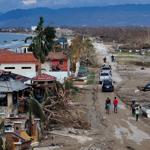Leading indicators slip, jobless claims rise
NEW YORK — A widely watched gauge of economic activity slipped in May, the Conference Board said Thursday, suggesting that the nation’s economy is likely to cool in the coming months.
Also indicating that economic growth is losing steam, the Labor Department reported Thursday that the number of Americans filing claims for unemployment benefits climbed by the largest amount in five weeks.
"The two releases together suggest that the economy is currently enjoying sturdy growth, but growth is slowing, and will slow further in the months and year ahead,” said Mark Zandi, chief economist at Moody’s Economy.com.
The Conference Board, an industry-backed research group, said its Index of Leading Economic Indicators fell 0.6 percent to 137.9 in May after it declined 0.1 percent to 138.7 in April.
The May figure was in line with what analysts had expected.
The index is watched closely because it’s designed to predict economic activity three to six months in the future.
It was index’s third decline in six months, and the lowest figure since a reading of 136.9 in October. The drop in the index comes as gasoline prices run high, interest rates creep up, and the home sales market grows tepid.
Hundreds of miles from New Orleans, homeowners pay the price for Katrina
The letter begins: "We’re writing to you with what we know is unfortunate news about your Allstate Insurance.”
Startled, Marie Collins reached for her glasses, then a magnifying glass and pored over the letter, realizing with a sinking feeling this isn’t a standard mailing from the company that insures her home.
It was a cancellation. Her home was being dropped, the letter said, because it’s in the path of future hurricanes. But Collins doesn’t live in New Orleans or even Florida. She lives in New York City.
Hurricane Katrina may have made landfall on the Gulf Coast last year, but its impact is being felt hundreds of miles away, as insurers scramble to reduce their exposure to future catastrophes.
"It’s outrageous,” said Collins, who’s lived 81 of her 83 years in the same house in the New York borough of Brooklyn, where a devastating hurricane hasn’t hit since 1938.
Yet hers is one of 30,000 homes the nation’s No. 2 insurer, Allstate Corp., is canceling in coastal counties of New York, citing the need to protect itself from future storms. Other major players are following suit: Nationwide Mutual Insurance Co. is no longer writing new policies on the eastern half of Long Island.
While MetLife Inc. is requiring extra inspections and expensive storm shutters for new customers living within 5 miles of salt water.
It’s a strategy of retreat that’s unfolded before: After Hurricane Andrew in 1992, insurers drastically scaled back their presence in Florida, forcing residents into the expensive, state-run insurance pool. The difference is that now insurers are not just shedding policies in traditional hurricane targets such as Florida, but all along the eastern seaboard.
"My home is in the middle of Cape Cod. It’s nowhere near the beach. But we’re all being painted with the same brush,” said Paul Covell, 67, who recently received his cancellation letter from the Hingham Mutual Group, a Massachusetts-based insurer that dropped 5,000 of its customers on the Cape.
Recommended for you
Even though the Northeast has not had a direct hit in decades, the high replacement value of homes there makes it an especially vulnerable spot in an insurer’s portfolio.
"Homes in Long Island (N.Y.) have gone up in the last five years between 60 and 70 percent. Believe me, our rates have not gone up by 60 or 70 percent,” said Edward M. Liddy, chairman and chief executive of Northbrook-Ill.-based Allstate. "You look at our exposure and you say ’We want to have enough capital to protect and care for all our 17 million households across the country.’ To do that, you may have to reduce your exposure in a small way in other areas.”
Those in the industry stress that a single massive event like Katrina can wipe out years of savings, putting an entire company with policyholders all over the nation at risk.
Edward B. Rust Jr., chairman and CEO of State Farm Insurance Co., the nation’s largest personal property and casualty insurer, used Andrew as an example. In 1992, a subsidiary of the Bloomington, Ill.-based company, State Farm Fire & Casualty, was the top insurer of homes in the country. Claims from Andrew consumed the accumulated profit since its founding in 1935.
"That’s what these low frequency but high severity events can do. They eat up not just profit, but all the accumulated capital,” Rust said. "And I’m not talking about just policies in Florida — but in Seattle, in North Dakota, in Maine, in New York.”
One of the ironies of last year’s storm is that insurance companies reported a record $43 billion profit in 2005 — an 11.7 percent increase over the previous year and the highest net income since 1991, according to the Insurance Information Institute, a trade group.
Insurers say profits tell only half the story: The property-and-casualty insurance industry was able to weather the huge losses resulting from Katrina because they were themselves insured. Half the $58 billion in insured losses resulting from last year’s hurricanes were absorbed by reinsurers, companies that insure insurance companies, according to the institute.
Those same reinsurers are now sharply increasing their rates in all coastal areas, making it far more expensive to do business there.
But last year’s record profit is also the fruit of the insurers’ 14-year effort to insulate themselves from risk, beginning in 1992 when numerous insurers quit writing wind coverage in Florida. Two years later, the Northridge earthquake changed the landscape of earthquake coverage. Later, there were wildfires, mudslides and floods.
After each successive disaster, the industry added fine print to their policies, excluding more from their baseline coverage.
Increasing numbers of homeowners turned to state-run insurance pools, designed to be the insurer of last resort. Yet the Florida pool, known as Citizens Property Insurance Co., now receives 40,000 new applications a month. With 850,000 customers, the pool is soon expected to overtake State Farm as the state’s largest insurer.
Up and down the East Coast, even those who are able to find insurance are finding they’re now paying more for less.
For 23 years, New York City attorney Tom Talley insured his vacation home in the Hamptons for around $900 a year. This year, he decided to sell the residence and signed a contract to buy a different Hamptons home, a deal that nearly went sour when he almost failed to find insurance.
"I became panicked,” said Talley, 62, who found a carrier the day before his closing, paying triple what he paid before. He’s also getting less coverage: The policy — like many being written on the coast these days — includes a 2 percent hurricane deductible.
"The box of what type of risk they’re willing to allow is getting narrower and narrower,” said agent George Yates, an independent agent who sells insurance on Long Island and in the Hamptons.
Marie Collins says she understands the risk: As a girl in the 1920s, she planted a maple seed in her window box. It grew into a majestic tree, only to be toppled by one of the strong hurricanes that hit Brooklyn pre-World War II.
Her issue is loyalty: The house has been insured for 81 years — a period of time in which she’s never put in a claim. It has been insured by several carriers during that time and by Allstate for the last three years.
"I’ve been their customer for years,” she said of Allstate. "That should count for something.”<






























(0) comments
Welcome to the discussion.
Log In
Keep the discussion civilized. Absolutely NO personal attacks or insults directed toward writers, nor others who make comments.
Keep it clean. Please avoid obscene, vulgar, lewd, racist or sexually-oriented language.
Don't threaten. Threats of harming another person will not be tolerated.
Be truthful. Don't knowingly lie about anyone or anything.
Be proactive. Use the 'Report' link on each comment to let us know of abusive posts.
PLEASE TURN OFF YOUR CAPS LOCK.
Anyone violating these rules will be issued a warning. After the warning, comment privileges can be revoked.